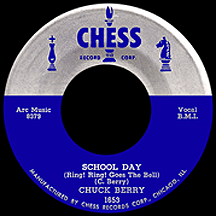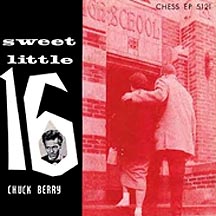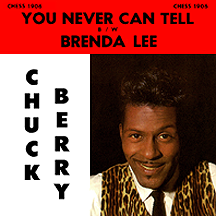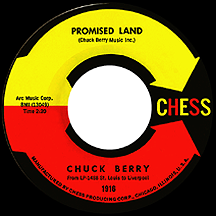CHUCK BERRY
We all know Chuck Berry is one of the greatest rock and roll artists. Having mastered the new art form by the mid-'50s, he went beyond simply promoting himself; he celebrated on behalf of the entire rock community, extolling the virtues of this music designed primarily for teenagers. You've heard the stories about Chuck: how he grew up in St. Louis and at an older age than most, his late twenties, traveled to Chicago, met Muddy Waters and auditioned for Leonard Chess of Chess Records per Muddy's suggestion. His run-ins with the law are well-documented: three, that's right, three convictions and prison sentences! The first, as early as 1944, for armed robbery (he claimed his innocence); the second, in the early '60s, for having relations with an underage girl (a career-threatening misjudgment on his part); the third, in 1979, for tax evasion (busted again, he pleaded guilty and got away with a shorter term).
Less well-known are the various jobs he toiled at before becoming a rock legend: janitor and automobile factory worker, in addition to taking college courses studying to be a beautician. None of it took. His guitar playing influenced by trailblazing 1940s blues great T-Bone Walker, Chuck began working clubs in St. Louis, eventually landing steady gigs with pianist Johnnie Johnson and his trio. A brief association with Joe Alexander and the Cubans in 1954 resulted in a calypso-styled recording on the Ballad label of "Oh Maria," on which he played guitar. It was Berry's first single release.
The fateful meeting at Chess came next, and the hits began immediately: "Ida Red" became "Maybellene" and with the song's hot opening guitar riff his long and successful career was under way. One hit followed another; the money was stacking up, so he started investing in real estate around St. Louis and in 1958 opened the Club Bandstand, welcoming all races, which was rare in those days. Picking up where he left off after the middle prison stretch, there were more hit records, and he found his influence had extended to younger fans, recording stars in their own right by the mid-'60s. The Beach Boys based their 1963 smash "Surfin' U.S.A." entirely on the melody of Chuck's "Sweet Little Sixteen." The lone writer credit to Brian Wilson was quickly changed to give complete acknowledgment to Chuck Berry. At about the same time, British acts that had grown up on rock and roll (chief among them The Rolling Stones and The Beatles) were releasing Berry's songs in their native land; in 1964 Berry toured the U.K., performing for adoring fans and popular artists alike, his nearly decade-long accumulation of hits serving him quite well.
Berry was a man of many talents, and despite the lapses of morality that led to criminal convictions over the years, one has to feel the world would have missed something monumental had he remained a janitor or chosen to work on the assembly line until retirement age...or, worse, spent his life behind bars. What most of us refer to affectionately as "Rock and Roll" would certainly have developed into something a little different, or perhaps even far less significant, had he not burst onto the scene with those blues-based guitar licks amped up into something uniquely Chuck. His instrumentation has been praised and dissected by critics for decades now. It has been copied and revered by musicians throughout that same half-century. It's what he's most famous for.
But I have a greater appreciation for another aspect of his talent and it's just a little at odds with popular opinion. Chuck's superior guitar gymnastics are not what he was best at; he will certainly be remembered throughout the centuries for a number of things, both great and dubious, but if he were to be carved in legend for one, and only one, thing, it is this: his songwriting. It was Chuck's greatest attribute and is his foremost contribution. His compositions covered a variety of relatable everyday topics: a love for women, cars and family ties, observations on industry and consumer products, reminiscences of high school life, friends and first loves, frustrations with inflation and other social issues resulting in the occasional protest song. Most of all a love for music and true passion for rock and roll. His collection of hit singles is remarkable, not as much for the sharp, dynamic musicianship (which at some point became routine and expected) but for the cast of characters he created and relatable stories the lyrics of his songs put forth. Here, then, are many of the best examples:
"Maybellene," the hit that established Chuck so spectacularly in the summer of 1955, was the first of his many songs with a car as the focal point. Whether his obsession grew out of working at the auto plant or just the basic interest in four-wheeled wonders that so many of us have at a young age, he was in a position to share his love of cars and did, many times. 'As I was motorvatin' over the hill, I saw Maybellene in a Coupe de Ville' painted a vivid, animated picture and introduced a new word into our vocabulary. "No Money Down" was released soon after, revealing a devil-may-care attitude when it came to purchasing a ride:
'Well mister, I want a yellow convertible, four door DeVille
With a continental spare and a wide chrome wheel
I want air conditionin', I want automatic heat
I want a full Murphy bed in my back seat
I want short wave radio, I want TV and a phone...
I'm burnin' aviation fuel, no matter what the cost
I want railroad air horns and a military spot
And I want a five year guarantee on everything I got!'
"Thirty Days" set down hard-to-abide-by rules to any woman in a relationship with Berry: 'I done called up a gypsy woman on the telephone, she's gonna send out a worldwide hoodoo, that'll be the very thing that'll suit you, I'm gonna sentence you to be back home in thirty days.' The song's lyrics even went so far as to threaten to get the FBI involved, or even take it to the United Nations...better just come on home, woman, it'll be easier that way!
"Roll Over Beethoven," in 1956, marked the beginning of Berry's mission to spread the word about the relatively new phenomenon of rock and roll. It was Chuck and all the teenagers against the rest of the world (in particular, the parents of those teens, for whom there seemed to be no hope of understanding or approval): 'You know my temperature's risin', the jukebox blowin' a fuse, my heart beatin' rhythm and my soul keep a-singing' the blues...Roll Over, Beethoven, and tell Tchaikovsky the news!' It was a clear, if slang-filled, message of a passing to the new guard. He went on to point out the diseases he'd developed: rockin' pneumonia and rollin' arthritis, surely the least painful of all ailments known to man (a shot of rhythm and blues is the quick cure).
"Rock and Roll Music" was unleashed the year after "Roll Over," the most straightforward endorsement of the hot trend taking over the world: 'Just let me hear some of that rock and roll music, any old way you choose it, it's got a back beat you can't lose it, any old time you use it...It's gotta be rock-roll music, if you wanna dance with me.' "Reelin and Rocking" continued the pro-rock theme, this time describing the thrills and inevitable body aches associated with dancing all night. Each time he looked at his watch he found himself in a different spot: '...Man, I didn't know if I was dead or alive!'...'I was dancin' with a woman who was twice my size!'...'The band leader said, We ain't playing no mo!' after which the party ends around the break of dawn.
"Too Much Monkey Business" was the first of Berry's hit protest songs, a gripe session about whatever was bothering him, trivial or otherwise:
'Runnin' to and fro, hard workin' at the mill
Never failed in the mail yet, come a rotten bill!...
Too much monkey business for me to be involved in!
Same thing every day, gettin' up, goin' to school
No need of me complainin', my objection's overruled - ahh!...
Workin' in the fillin' station, too many tasks
Wipe the windows, check the tires, check the oil, a dollar gas - ahh!
Too much monkey business...
I don't want your botheration, get away, leave me be!'
"Brown Eyed Handsome Man," the flip side of "Monkey Business," made Chess 1635 one of the greatest of all two-sided 45s. He was in rare form, rhyming about a man he saw himself to be:
'Flyin' 'cross the desert in a TWA, I saw a woman walkin' 'cross the sand
She been walkin' thirty miles en route to Bombay
To meet a brown eyed handsome man...
Marlo Venus was a beautiful lass, she had the world in the palm of her hand
She lost both her arms in a wrestling match
To meet a brown eyed handsome man...
Two-three the count with nobody on, he hit a high fly into the stand
Roundin' third he was headed for home
It was a brown eyed handsome man!'
"School Day" simply tolerated higher education, preferring to celebrate the joys of rock and roll once three o'clock rolled around: 'Hail! Hail! Rock and roll, deliver me from the days of old...long live rock and roll, the beat of the drums loud and bold...Rock! Rock! Rock and roll, the feelin' is there, body and soul.' "Almost Grown" had its own perspective on anticipating adulthood: 'Yeah, and I'm doin' alright in school, they ain't said I broke no rules, I ain't never been in dutch, I don't carouse around too much...I don't run around with no mob, got myself a little job...Got my eye on a little girl, ah she's really out this world...Don't bother me, leave me alone, anyway, I'm almost grown!'
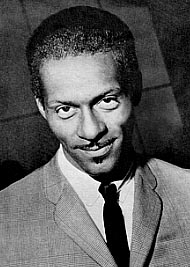
Chuck populated his songs with a cast of mostly-juvenile characters - you may even personally know some of them. In 1958 he had his biggest hit (until much later, anyway), the number two smash "Sweet Little Sixteen," about a girl who's '...just got to have about a half a million famed autographs.' That's one amazing young lady, to amass such a collection in just 16 years! One of Berry's most infamous characters was "Johnny B. Goode," 'who never ever learned to read and write so well, but he could play a guitar just like a ringin' a bell...He used to carry his guitar in a gunny sack, go sit beneath the tree by the railroad track...All the engineers would see him sittin' in the shade, strummin' with the rhythm that the drivers made...The people passin' by, they would stop and say, oh my but that little country boy could play...Go, Johnny, go!'
"Carol" was obviously a girl Chuck had eyes, and competition, for: 'Oh Carol, don't let him steal your heart away...I'm gonna learn to dance if it takes me all night and day.' "Sweet Little Rock and Roll" was even younger than "Little Sixteen": 'She's nine years old and sweet as she can be, all dressed up like a downtown Christmas tree, dancin' and hummin' a rock-roll melody.' "Anthony Boy," a likely school chum, was not above being teased: 'Hey there, Tony me boy, why you in such a rush? That girl she want to talk to you, look at him he's-a blush.' Chuck had a crush of his own, "Little Queenie." Her name alone told you she was a hottie. The lyrics elaborated: 'There she is again standin' over by the record machine...lookin' like a model on the cover of a magazine...she's too cute to be a minute over seventeen!' The most significant female in his life was the subject of the heart-tugging "Memphis, Tennessee," her age and relationship to him at first a mystery. It may very well be Berry's lyrical masterpiece:
'Help me information, more than that I cannot add
Only that I miss her and all the fun we had
But we were pulled apart because her mom did not agree
And tore apart our happy home in Memphis, Tennessee...
Last time I saw Marie she's waving me goodbye
With hurry home drops on her cheek that trickled from her eye
Marie is only six years old, information please
Try to put me through to her in Memphis, Tennessee'
"Back in the U.S.A." was the A side of the 1959 single release of the unexplainable non-hit "Memphis" (another top-notch two-sider regardless). Its words speak to everyone about the welcome feeling of coming home:
'Did I miss the skyscrapers, did I miss the long freeway?
From the coast of California to the shores of the Delaware Bay
You can bet your life I did, 'til I got back in the U.S.A.
Lookin' hard for a drive-in, searchin' for a corner cafe
Where hamburgers sizzle on an open grill night and day
Yeah, and a juke box jumpin' with records like in the U.S.A.'
"Come On," another in the recurring series of car songs, revealed a destructive tendency you wouldn't expect Chuck to level against one of the mechanical objects of his affection: 'Everything is wrong since me and my baby parted, all day long I'm walkin' 'cause I couldn't get my car started...laid off from my job and I can't afford to check it, I wish somebody'd come along and run into it and wreck it!' The Rolling Stones were so impressed that they recorded the song for release as their very first single. He made use of public transportation in his next attempt at romance, chasing down "Nadine":
'As I got on a city bus and found a vacant seat
I thought I saw my future bride walking up the street...
I saw her from the corner when she turned and doubled back
Started walking toward a coffee-colored Cadillac...
Downtown searchin' for her, lookin' all around
Saw her gettin' in a yellow cab headin' uptown...
I caught a loaded taxi, paid up everybody's tab
Flipped a twenty dollar bill and told him catch that yellow cab!'
That Nadine was one elusive gal - with ease, she gave him the slip. Motorvating once again, he found himself with "No Particular Place To Go," leading to further frustration:
'No particular place to go, so we parked way out on the Kokomo
The night was young and the moon was bold
So we both decided to take a stroll
Can you imagine the way I felt? I couldn't unfasten her safety belt!
Ridin' along in my calaboose, still tryin' to get her belt a-loose
All the way home I held a grudge for the safety belt that wouldn't budge'
"Promised Land," from 1964, told of a trip from Norfolk, Virginia through Raleigh, Charlotte, Rock Hill, Atlanta, Birmingham, Mississippi, New Orleans, Houston, Albuquerque and on to the Golden State, finally making a phone call: 'Los Angeles give me Norfolk, Virginia, Tidewater 4-ten-0-9...tell the folks back home this is the promised land callin' and the poor boy is on the line.' If all of the above examples don't qualify as inspired poetry, I don't know what does.
Jumping several years ahead to 1972, Chuck had his one and only number one hit with a song that he didn't write (gasp)! "My Ding-A-Ling" was a suggestive novelty/crowd participation song (the "ding-a-ling" being a toy or a certain body part...it's up to the listener to decide). He had been performing the song in concert since the mid-1950s and, although his name appears on the label as songwriter, its creation can be traced at least as far back as Dave Bartholomew's 1952 single with the same title. Chuck's follow-up, a live recording of "Reelin' and Rockin'" (complete with all-new apostrophes in the title!), took on new meaning as well. In this updated version, each time he looked at his watch he found himself in a different position, and it would seem he was no longer dancing: '...She said she didn't, but I know she do'...'You know she made a little move that made me stretch out straight, yeah'...'You know she called me right back and made me do it again!' In the 1970s it had become more permissible for Chuck to be honest about his true intentions as far as women were concerned.
Few rock and roll recording artists (as opposed to those professionals who focus primarily on songwriting) have consistently come up with clever lyrics the way Berry did. All of the songs I've cited are short slices of life with the emotions, challenges and experiences we've all known. It's hard to choose which is his most shining moment as a lyricist; "Memphis, Tennessee," "Brown Eyed Handsome Man" and "Johnny B. Goode" would all have to rank at or near the top. But my nomination for the song that showcases Chuck at his most inspired and whimsical, creative and brilliant, is "You Never Can Tell":
'It was a teenage wedding and the old folks wished them well
You could see that Pierre did truly love the Mademoiselle...
They furnished off an apartment with a two-room Roebuck sale
The coolerator was crammed with TV dinners and Ginger Ale...
They had a hi-fi phono, boy did they let it blast
Seven hundred little records, all rock, rhythm and jazz...
They bought a souped-up jitney, was a cherry red '53
And drove it down to Orleans to celebrate their anniversary
It was there where Pierre was wedded to the lovely Mademoiselle
C'est la vie, say the old folks, it goes to show you never can tell!'
A thousand years from now, when someone mentions that Chuck Berry was a rock and roll innovator, or one the best guitar players of all time, those will be true statements. But as far as I'm concerned, he should be most fondly, and prominently, remembered for his greatest talent: songwriting.
NOTABLE SINGLES:
- Oh Maria - 1954
by Joe Alexander and the Cubans - Maybellene /
Wee Wee Hours - 1955 - Thirty Days (To Come Back Home) - 1955
- No Money Down - 1956
- Roll Over Beethoven - 1956
- Too Much Monkey Business /
Brown Eyed Handsome Man - 1956 - You Can't Catch Me /
Havana Moon - 1956 - School Day (Ring! Ring! Goes the Bell) - 1957
- Oh Baby Doll - 1957
- Rock and Roll Music - 1957
- Sweet Little Sixteen /
Reelin and Rocking - 1958 - Johnny B. Goode /
Around and Around - 1958 - Beautiful Delilah - 1958
- Carol - 1958
- Sweet Little Rock and Roll /
Joe Joe Gun - 1958 - Run Rudolph Run /
Merry Christmas Baby - 1958 - Anthony Boy - 1959
- Almost Grown /
Little Queenie - 1959 - Back in the U.S.A. /
Memphis, Tennessee - 1959 - Broken Arrow - 1959
- Let It Rock /
Too Pooped to Pop - 1960 - Bye Bye Johnny - 1960
- Jaguar and Thunderbird - 1960
- Come On - 1961
- Nadine (Is It You?) - 1964
- No Particular Place To Go - 1964
- You Never Can Tell - 1964
- Little Marie - 1964
- Promised Land - 1964
- Dear Dad - 1965
- My Ding-A-Ling - 1972
- Reelin' and Rockin' - 1973


